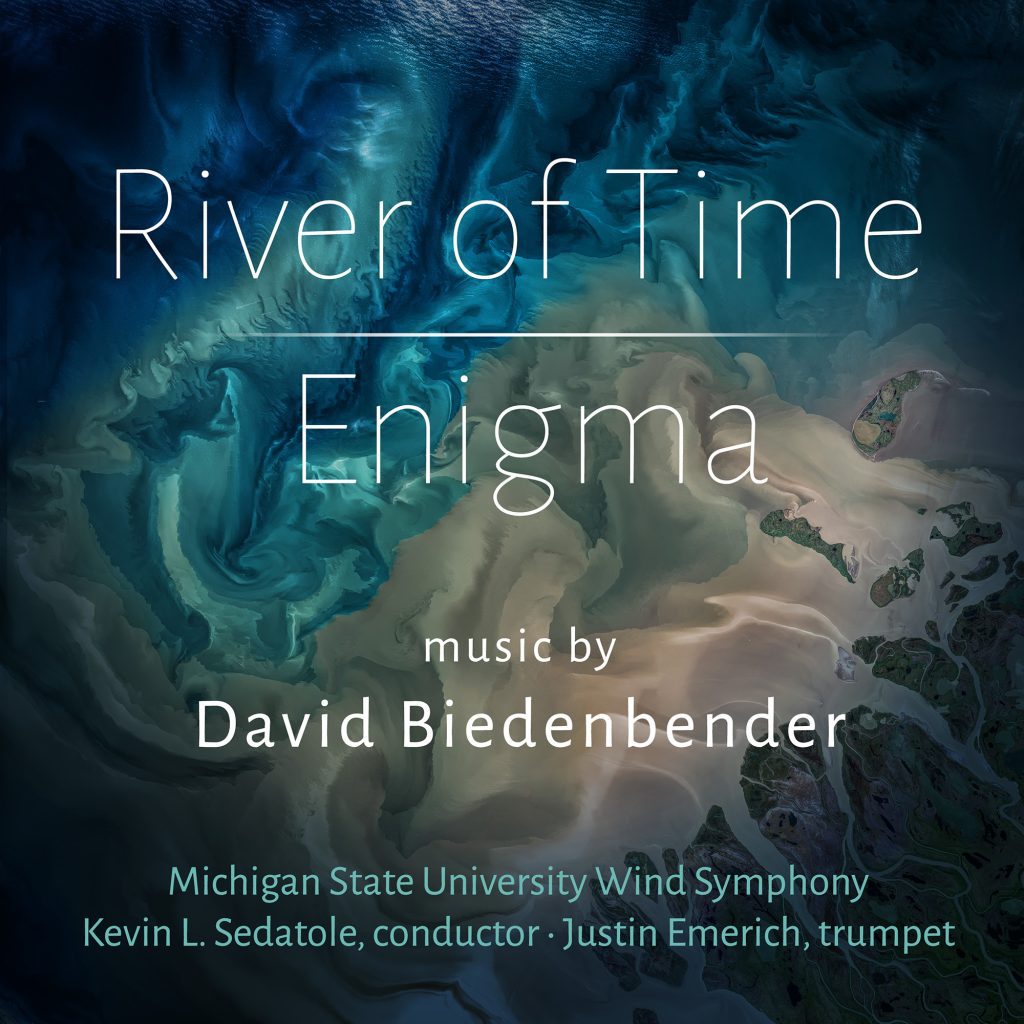Conductor Kevin L. Sedatole and the Michigan State University Wind Symphony’s new digital release features David’s Enigma and River of Time (trumpet concerto) with soloist Justin Emerich.

Composer
Conductor Kevin L. Sedatole and the Michigan State University Wind Symphony’s new digital release features David’s Enigma and River of Time (trumpet concerto) with soloist Justin Emerich.

The William D. Revelli Memorial Composition Contest has awarded prizes since 1977. It is named after Dr. William Revelli, who served as Director of Bands at the University of Michigan for 36 years, and served as NBA President from 1976-78.
Listen to Enigma.
More about Enigma and my journey as a composer:
I am a composer because of my experiences in band. Playing in my high school concert band, jazz band, marching band, pep band, pit orchestra, and several related chamber ensembles pulled me into arranging music. By luck, in my senior year, I attended an incredibly inspiring lecture by Augusta Read Thomas at Central Michigan University, and I immediately went home and began writing my first piece—a thirteen plus minute piece for band. I got to conduct the premiere, and I was hooked.
I was very fortunate to have several supportive mentors when I first started writing, including Matt Taton, Jennifer Grantham, David Gillingham, and José-Luis Maurtua.
I studied with José-Luis as an undergraduate at CMU. Unfortunately, in the summer of 2022, José passed away far too young after battling pancreatic cancer. José was into details. I remember one lesson spent on one bar of music – considering every possibility of orchestration, every nuance, and then notating it all with absolute clarity. When we were done, he said “now apply this level of care and attention to every bar in the piece.” It’s a lesson that stuck with me. He also taught me the importance of deeply knowing music that you love. We spent many hours dissecting and analyzing pieces in order to understand how they worked – “this forms the foundation of your compositional toolbox,” he said.
Now, I often ask my students, “What do you love and how does it work? Start there.” This ethos has become the starting point for every piece I write.
J.S. Bach’s “Passacaglia and Fugue in C minor” has long been one of my desert island pieces, and I had been mulling over the possibility of writing some sort of homage to it, perhaps built on the same passacaglia theme, for years. It’s a piece that I LOVE. After José passed, I decided that it was time. I wanted to hide Bach’s theme at first, revealing it gradually over the course of the entire piece. There is a long tradition of building a piece on someone else’s materials – in fact, this is how composition was taught for a long time, through counterpoint exercises. But I also think of this as an opportunity to converse with the past – to sort of write a love letter to music and a musician that I greatly admire.
For me, there’s a paradox in this – that in building on something old we often discover something new (at least for ourselves). That was my hope with “Enigma,” and perhaps, in some small way, to commune with and remember José, thanking him for teaching me so much.
I have now been teaching for long enough to have students out in the world doing really cool and brilliant things. Dr. Henry Dorn, now conductor of the St. Olaf Band, came to Michigan State University College of Music to study conducting and composition (He is equally brilliant at both and has two doctorates!). Henry heard the original version of “Enigma” for brass choir and organ and asked me to create a transcription for band. He premiered it with the St. Olaf Band in January of this year, and I am forever grateful to him for making this happen.
David is the winner of the 2024 Sousa-ABA-Ostwald Award for River of Time (Concerto for Trumpet and Wind Ensemble).
The official Sousa-ABA-Ostwald performance of River of Time will take place at the 90th ABA Convention in Chattanooga, TN, on February 28, 2025. The United States Army Band “Pershing’s Own” will perform the work.
Listen to a recording and view the score to River of Time.
River of Time was selected from an exceptional list of works that included 152 entries from composers representing 14 countries. The three additional finalists included David Biedenbender (Enigma), Gala Flagello (The Bird-While) and Will Healy (Passages).
David’s first portrait album, all we are given we cannot hold is released on Blue Griffin Records. The album includes performances by the Pittsburgh New Music Ensemble, Garth Newel Piano Quartet with clarinetist Mingzhe Wang, and the Haven Trio. Two of the works are settings of poetry by Robert Fanning.
David the featured guest composer at the 2023 International Trombone Festival. Composers Workshop participants will have the opportunity to work with David and his music will be performed.
David’s dream of ember, dream of star was named a finalist in the 2022 National Band Association Revelli Composition Contest.
David’s Severance (concerto for saxophone quartet and wind ensemble) was named one of three finalists for the 2022 American Bandmaster’s Association Sousa/Ostwald Prize. David’s Michigan State University colleague Zhou Tian was awarded the prize for his Sinfonia.
David will join renowned saxophonists from around the country in Norman, Oklahoma as the featured composer for the 2022 Great Plains Saxophone Workshop at the University of Oklahoma. Faculty include the H2 Quartet, Joseph Lulloff, Nikki Roman, Christopher Creviston, Stephen Page, Jordan Lulloff, John Nichol, and Hannah Creviston. David will present his creative work and teach composition lessons, and there will be a recital featuring his music.